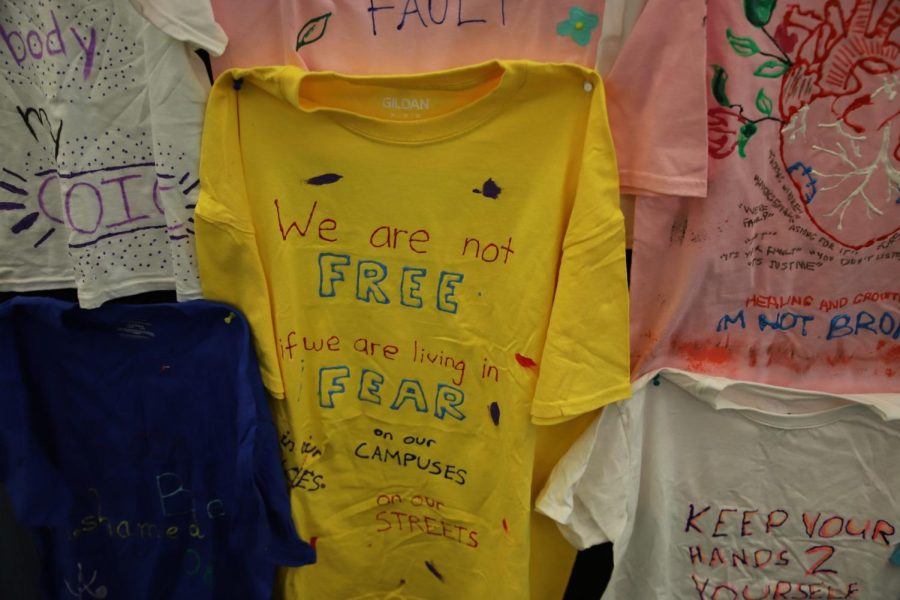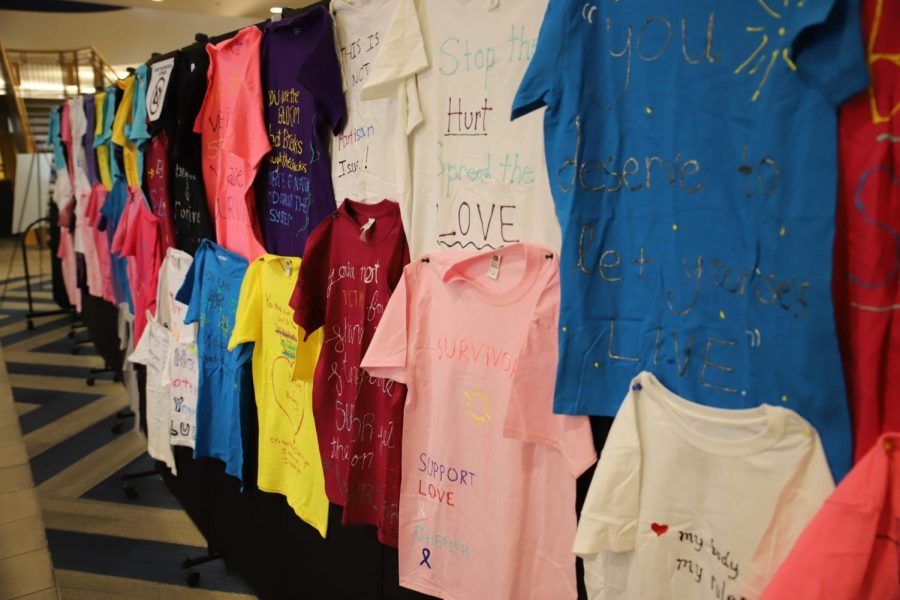‘It needs to be taken seriously’: 2nd annual Clothesline Project continues its work on breaking the silence
The Clothesline Project focuses on bringing awareness to stigmas surrounding sexual assault.
More than 30 colorful T-shirts hung in the Lincoln Park Student Center Friday night, beckoning many who entered to look closer. However, the display revealed its somber message to students who neared it.
One student wrote, “It’s not consent if you made me afraid,” on a black t-shirt.
Another wrote, “I was a child; she was even younger. How could you do that?” on a yellow t-shirt.
Sara Heidbreder, a former sexual relationship and violence prevention specialist at the Office of Health Promotion and Wellness (HPW), initiated DePaul’s Clothesline Project last year. Now in its second year, the exhibit continues to recognize April as Sexual Assault Awareness Month, allowing participants to take control of their narrative while creating an atmosphere of strength and empowerment.
As a collaboration between HPW and DePaul’s Women’s Center, the nationwide project serves to increase awareness of the long-term effects of interpersonal violence and provide resources for survivors to fight the stigma surrounding sexual, physical and emotional abuse.
“For sexual assault awareness month, we really wanted to bring this to our community to really show people the hugely negative impact and how it relates to our greater societal standards,” said Olivia Stephens, a DePaul senior and member of HPW.

Originating in 1990 in Massachusetts, the Clothesline Project began as a way for women’s groups to educate the public on the staggering statistics of gender-based violence. Rachel Carey-Harper, a visual artist from Cape Cod, Mass., created the concept of using T-shirts and a clothesline for survivors to surrender their pain and walk away. In the over three decades since the project’s establishment, around 50,000 to 60,000 shirts have been hung up globally, according to the Clothesline Project’s website.
“It’s an art exhibition as well, it’s student art and what students have to say about their own experiences on these t-shirts,” Stephens said. “I think that is so powerful for giving voice to our experiences and giving voice to our collective body as a DePaul community.”
Eight different colored shirts make up the exhibition, with each color representing a specific crime. Pink shirts signify rape or sexual assault, while blue and green symbolize childhood sexual abuse. Purple indicates violence due to sexual orientation, gray for human trafficking and black represents individuals disabled due to abuse or targeted because of their disability. White commemorates those who have died due to violence, and yellow for survivors of physical abuse. Survivors compose anonymous messages on shirts colored to match their experience.
Ann Russo, DePaul professor and director of the Women’s Center, expressed the event’s significance for survivors and onlookers.
“Visibility is so important as the issue of sexual violence is not on the radar of most people, while the experience is pervasive,” Russo said. “The exhibit brings out people’s voices, experiences, responses, grief as well as anger, and calls for justice. It can be very affirming for those who have experienced violence or been impacted, and it can be a good wake-up call for those who haven’t thought about it.”
Often collaborating on projects concerning sexual, interpersonal and domestic violence, the Women’s Center strives to create a supportive environment for students, faculty and staff, while offering various services, ranging from mental health to relationship abuse.
Additional resources accompanied the exhibit. Greenlight Family Service, a social service group located in Uptown specializing in helping survivors of campus sexual assault, set up an information booth with resources and services for attendees. The group offers up to 20 free sessions for students who experienced sexual assault while in college or graduate school, according to its website.
However, despite the exhibit’s yearly success, individuals like Russo believe that the university should be doing more to acknowledge the issue of sexual assault on college campuses.
“For it [sexual assault on college campuses] to be taken seriously, it needs to be taken seriously,” Russo said. “It needs to be addressed, publicized, talked about, understood and more. Without this, the invisibility continues, and people think that it’s not happening or that it’s not that big of a deal.”
Women between 18-24 face an elevated risk of sexual violence, and 13% of all college students experience rape or sexual assault, according to the Rape Abuse and Incest National Network.
“I think what ends up happening is the student organizations on campus end up being the people who bear the brunt of the burden when dealing with assault on campus,” said graduate student Keish Lozano. “It often feels like students are doing their best to support students after the incident and act as a stopgap measure because the institution doesn’t.”
Still, the Clothesline Project sparked a conversation that cannot be downplayed, Lozano said.
“At its core, the Clothesline Project is a project that fundamentally focuses on awareness, and that’s super important, but what I always hope when people see any project that is in this vein is that they move from awareness to attacking the issue,” Lozano said.
Members of DePaul’s community experiencing sexual and relationship violence can visit the Women’s Center or the Office of Health Promotion and Wellness for resources and counseling.
















